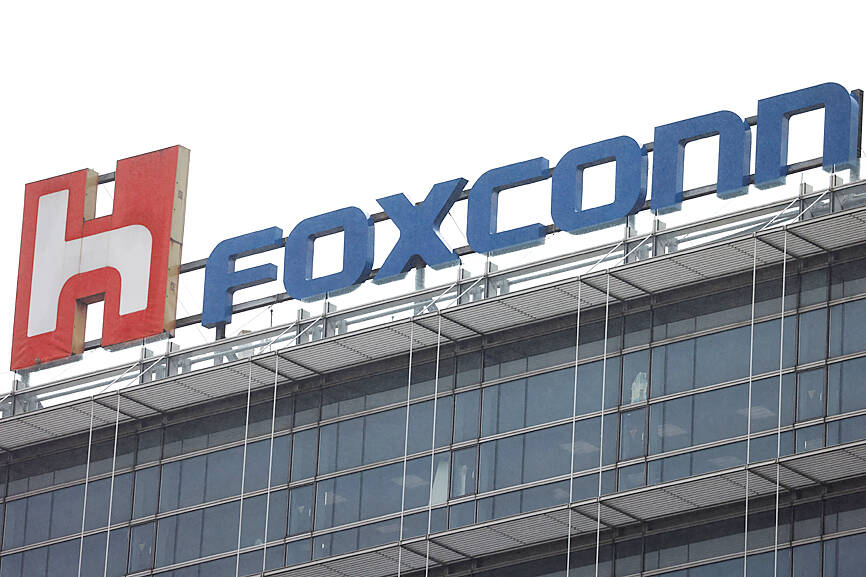More than 20,000 employees at Apple Inc supplier Foxconn Technology Group’s (富士康) huge Chinese plant, mostly new hires not yet working on production lines, have left, a Foxconn source familiar with the matter said yesterday.
The departures from the world’s largest iPhone factory dealt a fresh blow to the Taiwanese company, which has been grappling with strict COVID-19 restrictions that have fueled worker discontent and disrupted production ahead of Christmas and January’s Lunar New Year holiday.
Concerns are mounting over Apple’s ability to deliver products for the busy holiday period as the worker unrest lingers at the Zhengzhou plant, which produces the US company’s iPhone 14 models.

Photo: REUTERS
The departures could complicate Foxconn’s target of resuming full production by the end of this month, after the sometimes violent unrest, the source said.
In a rare case of open dissent in China, employees have complained about sharing dormitories with colleagues who tested positive for COVID-19.
They say they were misled over compensation benefits at the factory, which accounts for 70 percent of global iPhone shipments.
Foxconn on Thursday offered 10,000 yuan (US$1,395) to protesting recruits who agreed to resign and leave the plant.
The company apologized for a pay-related “technical error” when hiring, which workers say was a factor that led to protests involving clashes with security personnel.
Videos posted on Chinese social media yesterday showed crowds and long lines of luggage-laden workers waiting for buses.
“It’s time to go home,” one person posted.
Another Foxconn source familiar with the matter said some new hires had left the campus, but did not elaborate on how many.
This person said the departures had no impact on current production, as the new staff still needed to take training courses before working online.
“The incident has a big impact on our public image, but little on our capacity. Our current capacity is not affected,” the source said.

Zhang Yazhou was sitting in the passenger seat of her Tesla Model 3 when she said she heard her father’s panicked voice: The brakes do not work. Approaching a red light, her father swerved around two cars before plowing into a sport utility vehicle and a sedan, and crashing into a large concrete barrier. Stunned, Zhang gazed at the deflating airbag in front of her. She could never have imagined what was to come: Tesla Inc sued her for defamation for complaining publicly about the vehicles brakes — and won. A Chinese court ordered Zhang to pay more than US$23,000 in

Taiwan Semiconductor Manufacturing Co (TSMC, 台積電) yesterday held its first board of directors meeting in the US, at which it did not unveil any new US investments despite mounting tariff threats from US President Donald Trump. Trump has threatened to impose 100 percent tariffs on Taiwan-made chips, prompting market speculation that TSMC might consider boosting its chip capacity in the US or ramping up production of advanced chips such as those using a 2-nanometer technology process at its Arizona fabs ahead of schedule. Speculation also swirled that the chipmaker might consider building its own advanced packaging capacity in the US as part

Taiwan Semiconductor Manufacturing Co (TSMC, 台積電) yesterday said that its investment plan in Arizona is going according to schedule, following a local media report claiming that the company is planning to break ground on its third wafer fab in the US in June. In a statement, TSMC said it does not comment on market speculation, but that its investments in Arizona are proceeding well. TSMC is investing more than US$65 billion in Arizona to build three advanced wafer fabs. The first one has started production using the 4-nanometer (nm) process, while the second one would start mass production using the

US President Donald Trump has threatened to impose up to 100 percent tariffs on Taiwan’s semiconductor exports to the US to encourage chip manufacturers to move their production facilities to the US, but experts are questioning his strategy, warning it could harm industries on both sides. “I’m very confused and surprised that the Trump administration would try and do this,” Bob O’Donnell, chief analyst and founder of TECHnalysis Research in California, said in an interview with the Central News Agency on Wednesday. “It seems to reflect the fact that they don’t understand how the semiconductor industry really works,” O’Donnell said. Economic sanctions would